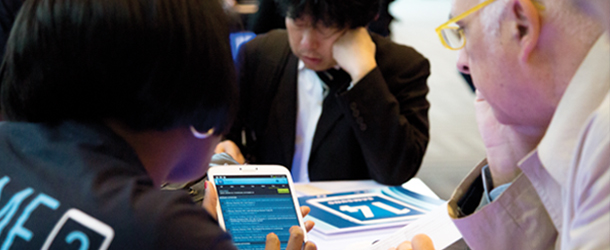Featured News
- Innovate
- Investigate
- Educate
By distributing tablets to attendees, TCT reinvents the medical conference.

For the first time in its history, the Transcatheter Cardiovascular Therapeutics conference went completely paperless and distributed tablet computers to all paid registrants for the full TCT week, a decision that reflects its 25-year history of forward thinking and innovation not only in the field of interventional cardiology but also in education.
“In addition to TCT’s usual focus on the latest research breakthroughs and developments in interventional cardiology, the tablet initiative is part of CRF’s overall long-term digital strategy to innovate and enhance medical education, making it more interactive, dynamic and informative. Our goal was to optimize the educational experience and enhance learning for all meeting participants.”
- Gregg W. Stone, MD
Johnnie White, executive director of the CRF Center for Education highlighted another benefit to the new format. “You’re able to have access to the most up-to-date content for the TCT program,” he said, noting that the app was updated frequently to keep pace with events during the conference.
Going paperless is not a new idea when it comes to medical conferences. Many physicians have likely attended a conference with information available online. However, these meetings rely on the attendees to have a tablet, computer, or smartphone to access that information.
At TCT 2013, instead of a bulky conference bag stuffed full of programs, calendars, abstracts, and agendas, each attendee received a Samsung Galaxy Tab® 3 8 tablet preloaded with all of the information needed to successfully navigate the conference.
Attendees were welcome to use their own mobile devices—there are downloadable Android and iOS versions of the app. Unlike program and abstract books, which are used for a few days and then typically discarded, the TCT tablet will serve as year-round educational tool that not only reduces waste but also enhances learning.
In addition to the traditionally preloaded apps like an Internet browser and e-mail, TCT preloaded two applications onto each tablet for the convenience of attendees:
Importantly, TCT and CRF did not collect any data from the tablet, and advertisements were only visible within the preloaded apps.
The tablet also allowed attendees to tally the number of CME hours they accrued at the meeting and to have a certificate sent verifying the credits.
If attendees arrived at the conference with their own tablet, they could download the apps through iTunes and Google Play.
TCT provided technical support for the tablets on the second floor of the West building, as well as at multiple kiosks located throughout the convention center.